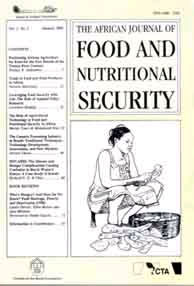
|
African Journal of Food and Nutritional Security
Quest and Insight Publishers and Friends-of-the Book Foundation
ISSN: 1608-1366
Vol. 1, Num. 1, 2001, pp. 1-2
|
Untitled Document
The African Journal of Food and Nutritional Security Vol. 1, No. 1, 2001,
pp. 1-2
Guest Editorial
Prof. James E. Otiende
Nairobi, Kenya
Code Number: fn01001
In 1998 the Friends-of-the-Book Foundation (Friends) made a proposal
to the Technical Centre for Agricultural and Rural Co-operation (CTA) to support
the publishing of three issues of the journal annually, The African Journal
of Food and Nutritional Security (AJFNS). Most African countries have a
food deficit due to a poorly developed agricultural infrastructure, diminishing
agricultural land, droughts and imprudent policies which encourage food imports.
This has stagnated agricultural development. yet Africans must consider the
provision of food and nutritional security a priority, if she will claim for
any stake in the new millenium.
The journal is instrumental in continuing informed discussion towards the
search for solutions to the African food and nutritional security conundrum.
All Africans should at all times be able to access an adequate quantity and
quality of nutritious food for active and healthy lives. Indeed, this is the
agenda of the journal being inaugurated. To realize this goal requires creative
and pragmatic approaches to the persisting, yet, surmountable food and nutritional
insecurity, occasioned by the reasons already alluded to. In effect, the question
of the African Renaissance can only be meaningful if it is stretched to its
limits to produce tangible results. Certainly, this calls for teamwork, involving
all concerned parties including key players, such as the scientific and business
communities as well as the public and private sectors.
From its inception in 1998 to 2001 when the inaugural volume of three issues
of the journal are finally off-press, has not been a short time to wait. Nevertheless,
both Friends and CTA firmly believing in the relevance of prioritizing
food and nutritional security for the development of Africa have patiently worked
and waited in the hope of making some modest contribution to the debate towards
alleviating the food and nutritional insecurity on the continent.
In this particular issue and those to follow, an attempt will be made to underpin
the agenda of the journal in both the manner of its presentation and selection
of articles. This issue therefore provides for consideration of strategic perspectives,
such as review articles, technology notes, new R & D papers, and book reviews.
The six articles included in this issue of The African Journal of Food and
Nutritional Security were specially selected to give readers an insight
into the different aspects of the context, forces and processes, which currently
shape food and nutritional security in Africa; including the rest of the Third
World.
Accordingly, under strategic perspectives, Odhiambo calls for a modernized
African science-led sustainable agriculture which critically puts food and nutritional
security at the core. Under review articles, Sekitoleko continues the
debate by calling on Africa to exploit her vast untapped agricultural potential,
so as to rekindle the moribund African economies. This, he suggests, is to be
done by putting in place sound agricultural policies in order to reduce the
number of chronically food insecure people on the continent. The point is that
most African economies are agriculturally-based; steam-rolled by agricultural
production and exports. On his part, Haddad wants food aid to be redefined so
as to reinvigorate African development directly through for example, food-for-employment-based
programmes rather than giving hand-outs, which only serve to perpetuate food
and nutritional dependancy. Both Toure and Noor further maintain that the spectre
of food and nutritional insecurity in Africa can be overcome through the deployment
of environmentally-friendly technology in agriculture. In short, the modernization
process will be propelled by research and extension, involving the public and
private sectors as well as the agricultural community, if sustainable economic
growth, food security and equity are to be realized.
Under technology notes, Chuzel offers an overview of the cassava-based
industrial production in Brazil which itself, is Third World country. The case
of processing cassava in Brazil demonstrates how a single food industry can
bring about major socio-economic changes if only the small and medium-scale
enterprises (SMEs) could access scientific and technological information, including
resources to establish R & D services as would happen in the developed countries.
Finally, K'Okul, under new R & D papers, analyses whether the low
quality of life in rural Western Kenya is due to hunger or HIV/AIDS. In this
study he concludes that severe thinning complications caused by malnutrition
and other chronic diseases could be mistaken for HIV/AIDS, particularly if such
a pronouncement is based on the Elisa and Western Blot methods whose results
are less reliable than the Polymerase Chain Reaction (PCR), which is DNA-based.
There are indeed, many issues which are central to the chronic food and nutritional
insecurity in Africa, which have not been delved into in this issue. However,
in the meantime, the debate has certainly thus far progressed, and will no doubt
continue to be the focal point of future issues. Indeed, the articles here offer
the reader sufficient glimpse into the intricate issues holding back Africa
and the Third World, from being food and nutritionally secure. If readers are
challenged to reflect on the prevailing food and nutritional situation in Africa
and hopefully resolve to act, then this journal would have served to further
one critical agenda of the new millennium.
Prof. James E. Otiende
Nairobi, Kenya
Copyright © Quest and Insight Publishers and Friends-of-the Book Foundation,
2001
|
